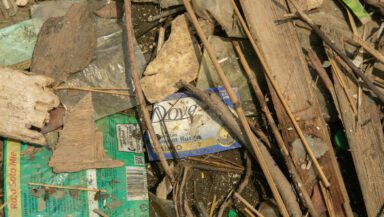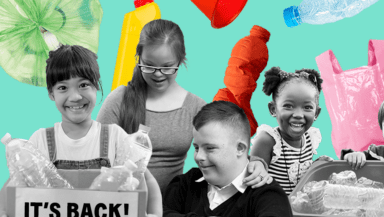SAINSBURY’S received more plastics complaints on Twitter than any of the top four supermarkets last year, Greenpeace analysis shows today.
- Sainsbury’s received more than 4,700 twitter complaints about plastics in 2018 – slightly more than the UK’s biggest supermarket Tesco, which has nearly double the market share.
- Activists deliver Twitter complaints and thousands more handwritten customer messages demanding action on plastics to Sainsbury’s head office.
- Greenpeace calls on Sainsbury’s to eliminate unnecessary and unrecyclable plastic by 2020.
This morning Greenpeace activists visited Sainsbury’s central London HQ to deliver 4,724 Twitter complaints, as well as 2,309 more handwritten messages collected from customers, to urge the supermarket to tackle its plastic problem.
It follows a survey of supermarket plastic policies[1] last year in which Sainsbury’s came last, and further findings that Sainsbury’s had made the least progress on introducing plastic-reduction measures[2] since January 2018. Greenpeace is calling for Sainsbury’s to set yearly plastic reduction targets, and start by eliminating unnecessary and unrecyclable plastic by 2020.
Elena Polisano, ocean plastics campaigner at Greenpeace UK, said: “Each and every day Sainsbury’s own customers are urging them to ditch throwaway plastic.
“Yet right now Sainsbury’s are failing them. In fact our research shows they are worst in class on plastic amongst all of the UK supermarkets
“It looks suspiciously like Sainsbury’s couldn’t care less about plastic pollution. If they want to keep their customers coming back they should step up and pledge to eliminate all unnecessary and unrecyclable plastic by the end of next year.”
Greenpeace analysed all tweets published in 2018 which made reference to plastic and which mentioned one of the top four supermarkets: Tesco, Asda, Sainsbury’s and Morrisons. In total there were more than 12,800 tweets that were complaints about plastic or demands to improve policies on plastic, of which 37% were directed at Sainsbury’s.
Sainsbury’s received slightly more plastics complaints tweets than the UK’s biggest supermarket, Tesco, despite having a much smaller market share.
| Supermarket | Total complaints and feedback on plastics | Proportion of complaints | Average market share over 2018 |
| Sainsbury’s | 4,724 | 37% | 15.8 |
| Tesco | 4,716 | 37% | 27.6 |
| Morrisons | 2,305 | 18% | 10.5 |
| Asda | 1,136 | 9% | 15.3 |
| Total | 12,881 |
Today Greenpeace activists delivered these Twitter complaints on a USB flash drive, plus thousands more customer messages to the head office of Sainsbury’s. Campaigners took trolleys filled with plastic packaging and handwritten messages which had been collected from Sainsbury’s shoppers from across the UK and delivered them to the central London headquarters.
Both Asda and Sainsbury’s, whose merger was last week blocked by the Competition and Markets Authority, have a similar market share of around 15%. But Sainsbury’s received more than four times as many complaints about plastics over the year.
Audio recordings of the customer messages were broadcast on a tannoy in the Sainsbury’s main reception area, and activists fixed a ‘Couldn’t Care Less’ banner beneath the big Sainsbury’s logo.
Despite plastic production being set to quadruple by 2050, retailers are still focusing more on recycling than reduction. Most major supermarkets including Sainsbury’s have committed to eliminate non-recyclable plastic packaging by as late as 2025 as part of the UK Plastics Pact, and the voluntary targets do not necessarily entail an overall plastics reduction. Many retailers have additional targets to eliminate problematic plastics such as PVC, expanded polystyrene and black plastic within the next two years – but not Sainsbury’s.
Every year the top 10 UK supermarkets place over 800,0001 tonnes of single-use plastic packaging on the market, so Greenpeace UK is campaigning for concrete action now.
Greenpeace launched its campaign targeting Sainsbury’s on March 29 after it found that Sainsbury’s was worst in class on plastic reduction, with the supermarket having made the least progress on plastics reduction since January last year.
Sainsbury’s responded by announcing plans to make reductions to its clothing ranges and by re-announcing some measures it had initially pledged in 2016. Greenpeace did not include clothing in its analysis, as not all supermarkets sell clothes.
ENDS
NOTES TO EDITORS
Images and video of the delivery of complaints can be found here: https://media.greenpeace.org/collection/27MZIFJWFZVAY
Spokespeople are available for interview. Please contact the Greenpeace press office at press.uk@greenpeace.org or on 020 7865 8255.
Sainsbury’s gets most Twitter complaints on plastics
- Greenpeace used a data tool to scrape all tweets in 2018 that mentioned plastics, and one of the top four UK supermarkets: Tesco, Asda, Sainsbury’s and Morrisons.
- The tool identified more than 21,239 tweets that were manually checked by Greenpeace to filter complaints about plastic and negative feedback about supermarket plastic, calling for plastics reductions. Of those tweets, 12,881 were complaints about plastic.
- Greenpeace excluded any tweets that related to its own campaigning work.
- Tweets that were a general comment on plastic but that were not directed at any particular supermarket were excluded.
- Tweets that were not complaints or feedback on single-use plastic were not included. For example, people asking for more plastic; people who had found foreign objects in food; people complaining about plastic litter near the store site.
Sainsbury’s worst in class on plastics
After we called out Sainsbury’s as having made the least progress on plastic packaging since January 2018, it added the following new pledges on plastic reductions to its website
- 175 tonnes– reducing plastic content from water bottles
- 5 tonnes – switching plastic trays to wooden on plants and flowers
- 65 tonnes – ready meals
- 181 tonnes – removing plastic bags from organic bananas, cauliflowers, cabbages, easy peelers and tomatoes
[1] Checking Out on Plastics: A Survey of UK Supermarkets’ Plastic Habits, Greenpeace UK and the Environmental Investigation Agency, 2018.
[2] Greenpeace calls out Sainsbury’s as worst in class on plastics, March 29th, 2019.



